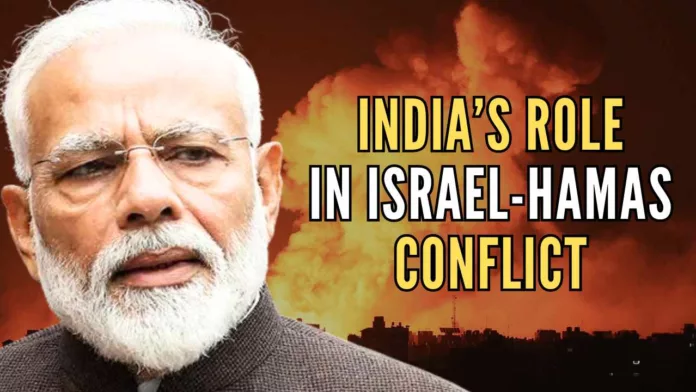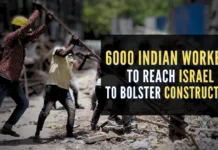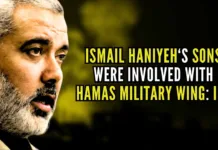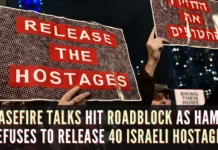
Israel-Hamas conflict and how India can adopt negotiation strategy
The current conflict started as Israel-Hamas, but nearly 12 days later, it is shaping as a large-scale war not just between Israel and Palestine, but Israel versus the surrounding Muslim nations. In fact, the potential exists to be the war dividing the world into two factions: the pro and anti-Israel. It can be framed Israel against Islam as increasingly Islamic countries are standing with Palestine in the name of Muslim brotherhood and overlooking the terrorist acts by Hamas? Can it even be characterized as a war between the Abrahamic religions in complete contradiction to the Abraham Accords[1]? No matter, how one slices the current conflict, humanity stands to lose big in terms of deaths, destruction, and serious environmental disaster.
Thus far, India’s Prime Minister Modi has tweeted twice; condemning terrorism (by Hamas) and expressing solidarity with Israel (both tweets given below). Undoubtedly, Modi is fulfilling his longstanding policy of standing firm against cross-border terrorism which India has suffered indiscriminately at the hands of terrorists harbored by its neighbor Pakistan. Modi expressed solidarity with Israel in the wake of indiscriminate terrorist attacks by Hamas but preserved the friendly ties with both Israel and Palestine. India characterizes Hamas differently than the more moderate Palestinians seeking a peaceful solution with Israel.
Deeply shocked by the news of terrorist attacks in Israel. Our thoughts and prayers are with the innocent victims and their families. We stand in solidarity with Israel at this difficult hour.
— Narendra Modi (@narendramodi) October 7, 2023
I thank Prime Minister @netanyahu for his phone call and providing an update on the ongoing situation. People of India stand firmly with Israel in this difficult hour. India strongly and unequivocally condemns terrorism in all its forms and manifestations.
— Narendra Modi (@narendramodi) October 10, 2023
It is no longer as simple and straightforward, however. The conflict is getting thicker by the day and the deeper lines are being drawn as the world powers visited Israel in the midst of the war. On the other hand, Putin traveled to China to discuss the Israel-Hamas conflict and possibly support Iran and Syria against Israel. There are signs of increased hostilities from Lebanon with backing from Iran. Russia is getting involved with humanitarian aid for Gaza and its warships moving into the area. Israel claims that Hamas used warfare made in North Korea. If so, China perhaps blessed it to indirectly provoke the United States.
Our question is where India stands in all of this and what role it can/ should play?
India, under Modi’s leadership, has uniquely maintained historic ties with Russia’s Putin while steadily strengthening its strategic relationship with the United States under three Presidents- Obama, Trump, and Biden. Recently, India has stood its ground in the Ukraine-Russia conflict even under intense pressure from the United States to take a stand against Russia. As G20 host, India cleverly got the unanimous New Delhi Declaration and avoided any discussion about the Ukraine-Russia conflict against political pressures by G20 influencers like the United States.
Today, Modi stands in an incredibly unique position of brokering a solution because of his “trusting” relations with the mutually distrusting leaders of the United States and Russia. Fortunately (or unfortunately), all conflicts end up being backed by one or the other so-called superpowers dividing the world. In the current conflict, Modi also has an exceptionally good chemistry with Israel’s Netanyahu, both have hosted each other, and both countries are engaged in strategic partnerships in areas of science, technology, defense, energy, and agriculture. Modi was given the highest national honor by Palestine during his historic visit as India’s Prime Minister.
Additionally, India has embraced the 2020 Abraham Accords, the enabler of normalized relations between Israel and some of its Arab neighbors. India is a part of the I2U2 QUAD, an alliance of India+ Israel (I2), and the UAE+ US (U2) to jointly focus on food security and clean energy. More recently, India got the new transport corridor, the India-Middle East-Europe-Economic Corridor (IMEC), signed on the sidelines of the G20[2]. It includes India, the US, Saudi Arabia, the UAE, France, Germany, and Italy. There was a handshake between President Biden and Saudi Crown Prince Mohammed bin Salman, who, in the recent past, have been at odds. Thus, Modi has earned trusting relationships and credibility with the leaders of the Western countries, Middle East, African nations, and Russia alike. India’s standing as a leader of the “free” world is strong enough to be an effective influencer in the present conflict.
In the current conflict, a major conundrum is if, when, and how Israel should negotiate with Hamas for the release of over two hundred hostages. Israel has openly and rightfully declared to hunt and kill Hamas leaders who instigated the indiscriminate killing of innocent men, women, and children inside Israel. Reportedly, the Hamas is holding hostages and even using its own people as human shields to protect themselves from the Israeli forces.
What India can/ should do? In today’s geopolitical toxic environment, the world is already divided due to the Ukraine-Russia conflict. Thus, Modi is the best choice for brokering stronger relations between Israel and its neighbors based on the principles of the Abraham Accords and peace based on a “two-state solution.” Modi must take the following steps.
- Modi should call the respective leaders and send India’s skilled top diplomats, Foreign Minister Jaishankar and National Security Advisor Doval, to Israel, Palestine, UAE, and Saudi Arabia for immediate talks. First, Israel and Hamas should be persuaded for an interim cease-fire in Gaza in exchange for the release of the hostages held by Hamas and getting the needed humanitarian relief (food, water, and medicines) on the ground. In this period, Hamas leaders are given the choice to leave Gaza for the destination of their choice with the possibility of Gaza being governed by an interim government of moderate Palestine.
- With relative calm on the Israel-Gaza border, a summit of select Islamic nations (e.g., Egypt, Jordan, the UAE, Iran, Syria, Lebanon, Palestine, Saudi Arabia), be convened by Modi in India. I dare call India a neutral ground because a majority of its own Muslims and many leaders of political parties oppose Modi’s stance against terrorism by Hamas. Nevertheless, Modi should make all-out efforts to reach a consensus among the Muslim nations’ leaders using his stature, diplomacy, and trust among world leaders.
- While India’s envoys are engaged in diplomacy, Modi himself should be on the phone with the United States, Russia, and other world leaders and seek the help of international organizations like the United Nations to achieve a long-term solution to the territorial dispute between Israel and Palestine.
There is a lot at stake with two major conflicts happening in the world. India’s Modi is best suited to broker peace and stability because of his hugging diplomacy, good chemistry, and trust among the world leaders. A workaholic, Modi has immense energy, capacity, and capability for understanding geopolitical issues and finding solutions. India is destined to be the Vishwa Guru with Israel-Hamas conflict resolution as the first step in this direction.
Note:
1. Text in Blue points to additional data on the topic.
2. The views expressed here are those of the author and do not necessarily represent or reflect the views of PGurus.
Reference:
[1] The Abraham Accords Declaration – U.S. Department of State
[2] India-Middle East-Europe Economic Corridor: A passage of possibilities – Oct 05, 2023, The Hindu
For all the latest updates, download PGurus App.
- Education and election in Bharat: Race to the top - April 16, 2024
- Kejriwal: “An Insignificant Man” or a corrupt politician with impending prison term - March 24, 2024
- Bharat’s general elections and the Model Code of Conduct - March 22, 2024










